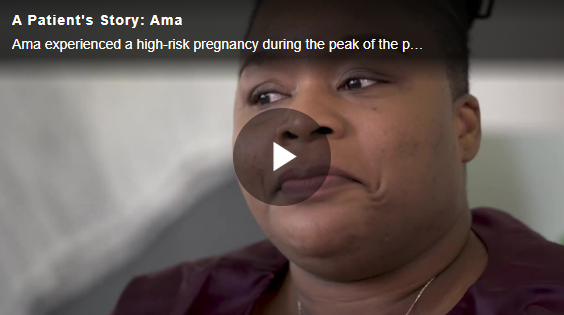Ama experienced a high-risk pregnancy during the peak of the pandemic. With her husband unable to attend appointments, her care team in the Massachusetts General Hospital Department of OBGYN became her surrogate family, helping her to deliver a healthy baby boy.

Ama: Eliel is very special baby. Eliel is, he means everything for me. He's just a blessing.
I lost one baby before Eliel. To lose a baby is such an awful moment. It was very, very hard, like grief, everything. It was like, too much. After that, it was hard to get pregnant again. So, when I was pregnant with Eliel, l I still have that little fear. But my first visit with Dr. Barth, he's like, it's going to be hard. But we will get through this. We're going to make sure this go to the end.
Bill Barth, MD: Ama had lost a child several years earlier. Her child lived for about three weeks and then passed away. And I think on the heels of that, with this next pregnancy, when she came to Mass General, she was nervous like anybody would be. There is not a lot of certainty in how to approach the next pregnancy when the prior pregnancy was lost. Ama had some features of cervical insufficiency and some features of preterm labor. And she developed diabetes. And so, it was a high-risk pregnancy.
Anne McFadd, RN: When you care for women that have had complicated pregnancies, traumatic losses, I think that they need to know that we're going to do everything we can to help them. Ama's pregnancy, it did require more nursing care and probably is part of what brought me closer to her.
Ama: So I was pregnant six weeks when COVID hit. Going to the hospital was a fear.
Anne: I think, for women during COVID, they really didn't have the supports that they would ordinarily have. Our waiting area looked very different. Women would come in all alone. So, we were the ones that were there with them for the first time, hearing their baby's heartbeat. Trying to make it still that moment that they wanted.
Ama: It wasn't like a pregnancy like I was dreaming about. Like to have my husband every time close to me, but Miss Anne, Dr. Barth, they always give me the energy to fight. It means a lot to me and give me that courage to go like, each week.
Anne: I found Ama to be a very special gift. She just gave us such hope in that she cared about us, too.
Dr. Barth: I don't think I was on call the day Ama delivered. But we get an alert on our phones or our computers when one of our patients gets admitted so we know they're in the hospital.
Ama: When I saw Dr. Barth, I was not expecting that he's going to be there. He came that morning and told me, Oh Ama, everything going be okay.
The first time they give me Eliel, I start crying. It was so like, the joy, I was so overwhelmed to hold my baby. I didn't even imagine I would be pregnant again, and like through all the things I've been through, like the risk of losing him. To have him really, like a person close to me. I was crying. My husband was crying. It was just like a such of joyful moment.
Anne: When I learned that she had her baby, I was on my way over as soon as I could.
Ama: Miss Anne, she was there for me. I don't have my parents here. I don't have any family here. But she was there every moment for me. She is my mother over there. Dr. Barth and Miss Anne, they treat me like family.
Dr. Barth: Across one's career, there is that rare patient where they care about you. They ask you how you're doing. And I think we got that from Ama. When I think about the things that keep me at Mass General, one of the most is you get to meet a lot of extraordinary people.
Anne: I think for me, Ama was a reminder of why I come to work every day. She made it feel like you were extraordinary when really, we were doing what we do all the time.
Ama: I feel blessed and like we have a happy ending, we have Eliel.


